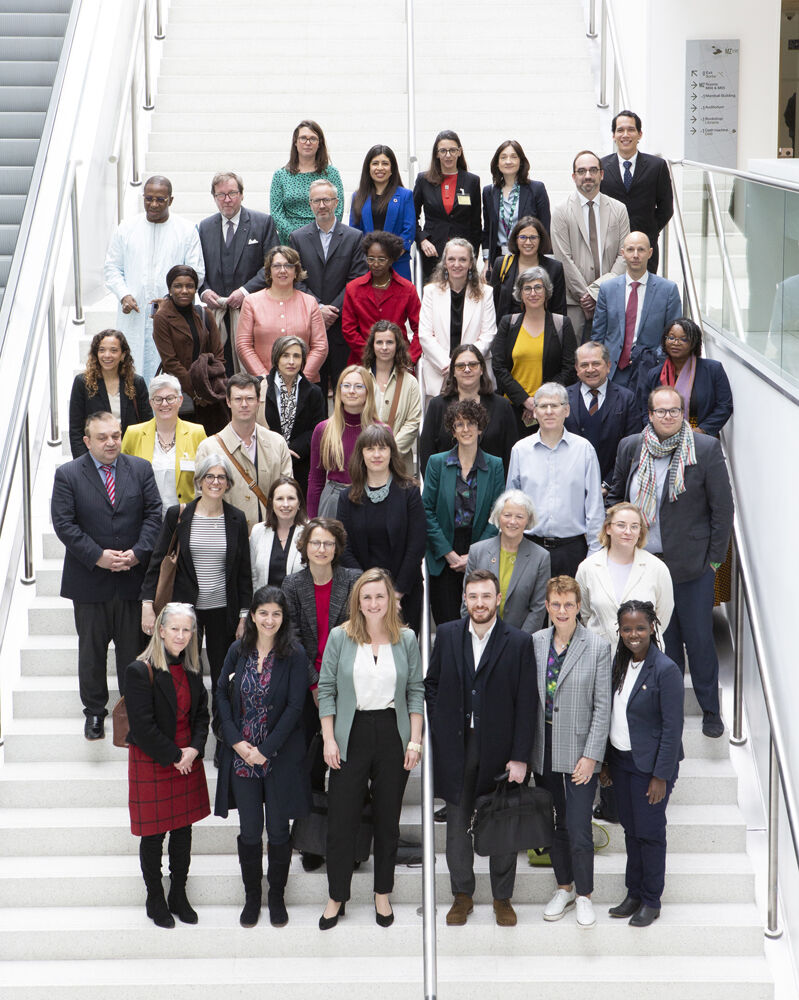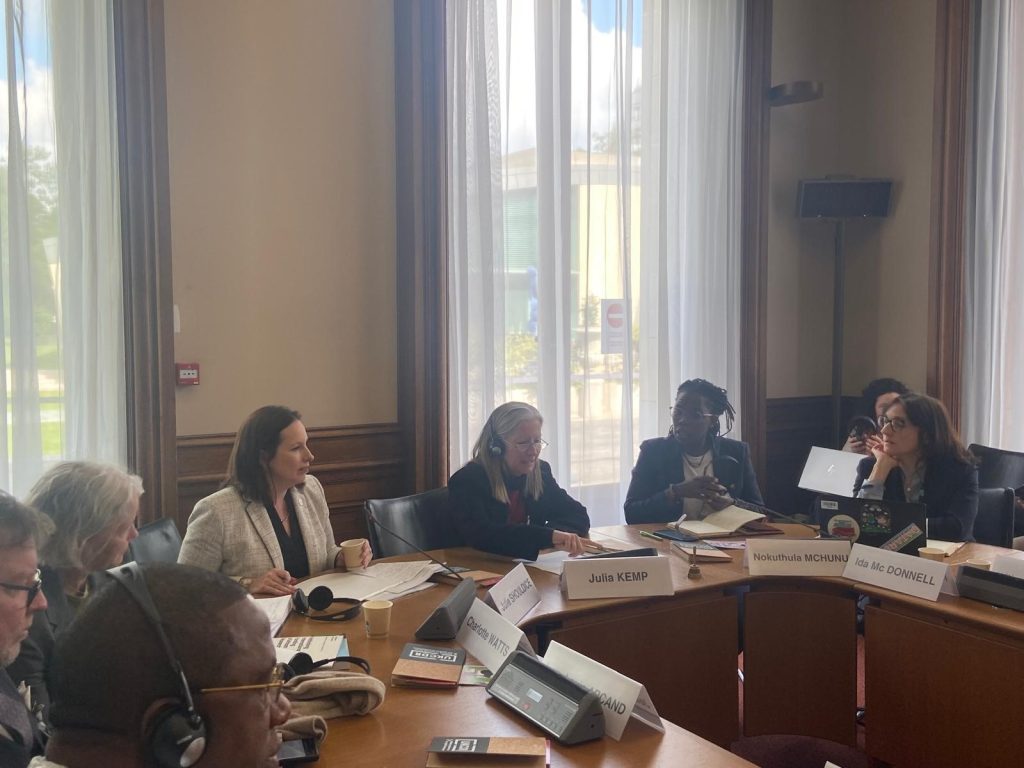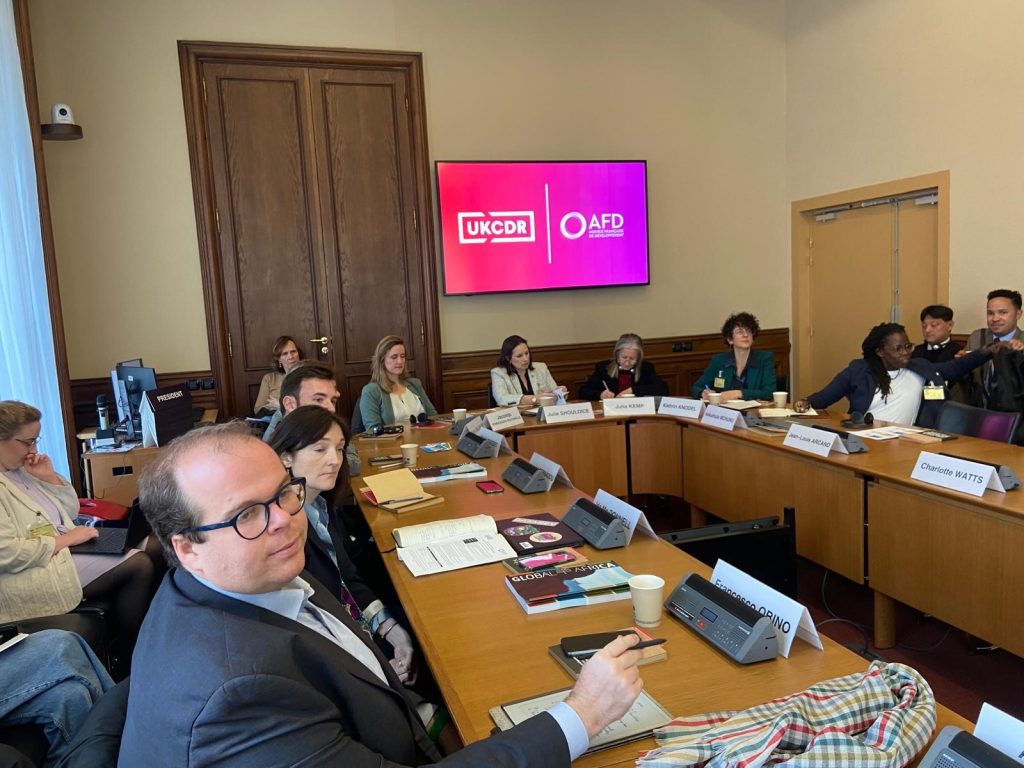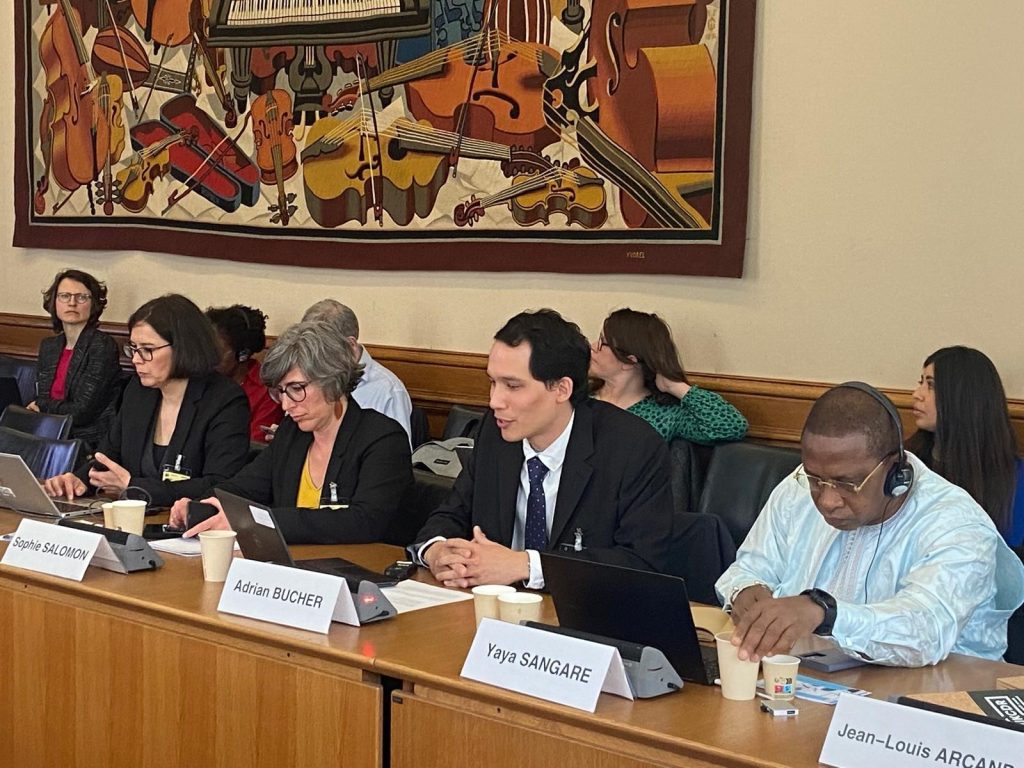Organization for Economic Co-operation and Development (OECD) Science and Technology Policy (CSTP) Ministerial
Pre-Ministerial Event Hosted by the UK Collaborative on Development Research (UKCDR) and Agence Française de Développement (AFD)
This bilingual (English/French) side event to the OECD CSTP Ministerial meeting was held in Paris on the 22nd of April 2024 and was a gathering of international public funders of research for development and a range of wider stakeholders (including representatives from government departments, international bodies, international research agencies, intergovernmental organisations, and non-governmental organisations). Jointly organised by UKCDR and the AFD, the overarching ambition of this event was to highlight research as a force for development. Two areas crucial to ensure the effectiveness of research for development were discussed:
- Promoting principle and good practices in funding research for development: Effective research funding and equitable partnerships approaches
- Informed decision-making and donor coordination: the challenge of production and availability of data on research and research funding
Opening remarks for this event were provided by Jens Lundsgaard, Deputy Director of the OECD’s Directorate for Science, Technology and Innovation. Other remarks were also provided by Thomas Melonio, Executive Director of Innovation, Strategy and Research at AFD, and Maggy Heintz, Executive Director of UKCDR. Opening remarks emphasised that the OECD’s strategy to tackle global challenges is underpinned by an emphasis on science, technology, and research. The Science and Technology Policy Ministerial intended to foster dialogue on the transformative power of research to deliver the Sustainable Development Goals (SDGs), which corresponded to the themes of UKCDR and AFD’s session.

SESSION 1: PROMOTING PRINCIPLES AND GOOD PRACTICES IN FUNDING RESEARCH FOR DEVELOPMENT: EFFECTIVE RESEARCH FUNDING AND EQUITABLE PARTNERSHIPS APPROACHES
Panel Chair:
- Etienne Charrière – Senior Editor, Publications, Agence Française de Développement, France
Panel Members:
- Mame-Penda Ba – Director, Laboratory for the Analysis of Societies and Powers/Africa – Diasporas (LASPAD), Senegal
- Hélène Djoufelkit – Director, Economic Diagnostics and Public Policy Department, Agence Française de Développement, France
- Yaya Sangaré – Secretary-General, Fonds pour la Science, la Technologie et l’Innovation (FONSTI), Côte d’Ivoire
- Frances Wood – International Director, UKRI, United Kingdom
The panel reflected on the timeliness of discussions around good practices in funding research for development: we are at a significant moment in global history, which arguably includes the fourth industrial revolution and ecological transition. Regarding Africa, this presents an opportunity to reshuffle the cards and ensure that Africa is not a recipient of funding but rather is integrated in the funding response to emerging challenges. The medium-term goal should be to strengthen the capacity of beneficiary institutions so that the continent can autonomously fund its research investment in a few decades.

It was noted that the African Union hopes to develop a more dynamic continent with inclusive and sustainable growth, for which it calls on member states to invest a minimum of 1% gross domestic product (GDP) in research. Nonetheless, achieving funding that is regular, sustainable, and long-term remains a significant challenge for African nations and the 1% commitment remains largely unfulfilled. Illicit funding flows were briefly discussed, with Africa reportedly losing 1.5b USD a year towards OECD countries.
Key themes from this discussion included how to embed equity in research partnerships, addressing asymmetries in research funding flows and identifying and managing tensions in research funding approaches.
“trust, humility and respect are key to success and […] the best development tool is empowerment”
Decolonising research, trust, respect and empowerment
A tension was noted between, on one hand, the goal of decolonising research and, on the other, dependency wrought by external funding for research conducted in Low- and Middle-Income Countries (LMICs). Panelists discussed how evolving funding practices both disrupt and perpetuate this cycle and highlighted the need for countries to have their own research agenda.
A tension was noted between, on one hand, the goal of decolonising research and, on the other, dependency wrought by external funding for research conducted in Low- and Middle-Income Countries (LMICs). Panelists discussed how evolving funding practices both disrupt and perpetuate this cycle and highlighted the need for countries to have their own research agenda.
Côte D’Ivoire’s Fonds pour la Science, la Technologie et l’Innovation (FONSTI) was discussed as a national research capacity strengthening case study. FONSTI is a research and innovation support fund, intended to finance high-quality scientific research and innovation projects in Côte d’Ivoire. FONTSI was created in 2018 to support the country to design and develop national policies focused on science and innovation. Among other goals, FONTSI mobilises resources to finance research and development and ensure that science, innovation and technology directly impact the population.
Power imbalances between High Income Country (HIC)- and LMIC-based actors remain and, while gains have been made in North-South inclusivity, genuine and embedded equity remains elusive. In this context, the Global North can and should do more to address extractive research practices. This includes ensuring local communities are genuinely consulted in research processes that affect them and valuing indigenous knowledge.
Balancing priorities: in Côte d’Ivoire, local people did not want any more research to be conducted in a nearby forest as they felt more attention was given to the local ape population than their own welfare. This example recalls the need for researchers to centre the social and economic value of their work.
As global challenges such as COVID-19 defy borders, international cooperation and collaboration are vital to effective research responses. In this context, it should be recalled that trust, humility, and respect are key to success and that the best development tool is empowerment. It was suggested that attention should also be paid to national contexts and specific volatilities, for example political instability in some African countries. For funding to be efficient, funders should be open to working with non-government actors.
Asymmetries in research funding flows: reputation and language
Asymmetries in research capacity among LMICs, specifically in Africa, was also discussed. Africa takes part in 3.5% of research globally, with 70% of this contribution stemming from South Africa, Nigeria, Kenya and Egypt. Funders emphasised that the deliberate desire to support Southern-led research is complicated by an understanding that certain countries are better placed to attract funding due to their established research reputation. A tendency for English-speaking countries to attract funding was also noted, emphasising language as a barrier, as was the lack of clear policy on research and innovation in conflict-affected countries. Meanwhile, it was suggested that a proliferation of policy documents can adversely affect research and innovation approaches if these are insufficiently co-ordinated and understood.
Frugal innovation
One way to transcend overly HIC-driven ways of thinking is giving due consideration to frugal innovation. The ability of economically constrained research actors to successfully innovate with limited funds was noted. The discussion highlighted the case of India and its approach to frugal research and innovation: doing more with less and pooling resources together, and discussions happening on the topic within the framework of the Global Research Council (GRC) initiative. This stems from the understanding of imbalances and the realisation that the Global South is not going to benefit from “MIT-like labs the day after tomorrow”. When research is 90% funded by external funding, the sustainability of the model needs to be questioned and Africa, and the Global South, need a paradigm shift.
Identifying and managing tensions
Panelists reiterated the need to engage consciously with tensions and challenges. These include: the interlinkages between different types of research; imposition of funders’ perspectives; research for public policy with different types of partners; the need to identify local partners and codesign activities with them; and working equitably with researchers and research centres rather than treating them as consultants. Tensions were also noted between research excellence and research integrity.
Funding
The importance of co-funding between High-Income Countries (HICs) and LMICs was discussed in relation to the principles of mutual respect and co-construction. There are multiple ways to fund without doing harm and evaluations should be made on an iterative basis. For example, it may be appropriate to fund an individual in one context and an institution in another. However, it was noted that Global North funders can help embed equity by partnering directly with Southern institutions and enshrining intellectual property sharing into partnership contracts. It is also important to promote the names of Southern researchers and South-South networks.
Interdisciplinarity
Panelists agreed that interdisciplinarity is key to research success. It was noted that while principles of open access, autonomy and equality should be core to interdisciplinarity and research collaboration more broadly, Northern funders have not always been sufficiently inclusive in their research and development approaches. Emphasis was placed on creating narratives of excellence around Southern-led research and providing space for researchers to develop their ideas and experiment accordingly.
Digitisation
The panel also discussed the risks and opportunities associated with increased research digitisation. It was posited that Africa will not benefit from the move toward open access without initial investment in the appropriate digital infrastructure, including data storage and data centres fit to confront today’s challenges. Currently, there are only adequate big data centres in a few African countries, including South Africa. The panel considered the need to consider digitalisation holistically, rather than as a trend specific to research.
SESSION 2: INFORMED DECISION-MAKING AND DONOR COORDINATION: THE CHALLENGE OF PRODUCTION AND AVAILABILITY OF DATA ON RESEARCH AND RESEARCH FUNDING
Panel Chair:
- Julia Kemp – Head of Major International Programmes, Wellcome
Panel Members:
- Charlotte Watts – Chief Scientific Adviser and Director for Research and Evidence, UK Foreign Commonwealth and Development Office (FCDO), United Kingdom
- Ida Mc Donnell – Head of Development Co-operation Research Unit, Development Co-operation Directorate, Organization for Economic Co-operation and Development (OECD)
- Jean-Louis Arcand – President, Global Development Network (GDN)
- Julie Shouldice – Vice-President, Strategy, Regions and Policy, International Development Research Centre, Canada
- Nokuthula Mchunu – Deputy Director, African Open Science Platform, National Research Foundation NRF, South Africa
Panel members reflected on how data supports evidence-informed decision-making in their respective organisations, including building data systems that further their institutional mandates. It was noted that while research impact is a major consideration for funders, questions remain as to how evidence for impact is produced and how the value of global public goods can be harnessed. Data-related questions for funders to consider include: how data is made available and accessible for researchers and policymakers; whether funders have the correct data for decision-making; and who generates the data. A crucial distinction was identified between data on research and data from research, which informed the flow of discussion.
Key themes from this discussion included the value of data on research for evidence-informed decision-making, inequities in global knowledge production and the development of digital research infrastructures, and the concept of data as a public good.
“When a question is asked on ‘where is the data?’, no one knows the answer. Is it available? Do researchers in LMICs have to pay for it, despite it being generated there?”
Data on research for evidence-informed decision-making
Data on research helps funders understand what they should fund and what is out of scope at a given time. Specifically, it helps funders identify the scale of a specific challenge and whether science and research can make a difference. This data is also crucial for understanding the research funding landscape; if research investment is already being made on a particular issue, a funder may choose to focus their resource elsewhere. It also provokes questions on whether partnering and pooling resources can contribute to a more robust research response to a particular issue, such as during the COVID-19 pandemic when funders had to consider which COVID-related issues specifically affected LMICs.

Data also enables funders to identify and describe priority areas for investment and UKCDR’s country-level mapping of UK research investment was mentioned as a positive case study. More broadly, data can support systems strengthening in international development. This includes the use of both qualitative and quantitative data to identify new business opportunities. Increasingly, international research funders are considering how artificial intelligence can be harnessed to promote partnerships and accelerate opportunities.
Data on research is also crucial for accountability, including formal statistics such as those that track country-level research spend for the OECD’s Development Assistance Committee (DAC) reporting. An OECD project, carried out in conjunction with the UK’s legacy Department for International Development (DfID), identified a lack of financing for national statistical systems among DAC members, with funding sitting at around €600m per year across member states. A need was identified for data on research funding to be systematically compiled and shared to ensure comparability and help understand trends over time. Current data suggests a drop in ODA spend for research and innovation since 2018, however fuller and more joined up accounting will be crucial for understanding this fully. A similar trend to only partially track data on research expenditure was noted among African countries. This data should be collected reliably and regularly.
Data from research: challenges and opportunities
Global inequities
Complexities and opportunities similarly abound in relation to data from research. GDN’s Doing Research Assessment maps were highlighted as a tool for understanding social science research ecosystems ‘on the ground’ and reinforcing the value of locally produced knowledge. The panel reflected that much research produced in, with, and about LMICs remains inaccessible to LMIC-based researchers due to paywalls and other infrastructural limitations that perpetuate existing inequalities.
Inequitable knowledge production: An estimated 80% of research about LMICs is produced by researchers based in high-income countries. Meanwhile, Africa is estimated to publish less than 4% of global research.
Challenges and opportunities remain regarding the production of equitable digital infrastructures and a discrepancy was noted in the cost of cloud computing for LMIC-based researchers in comparison to HIC-based researchers. Open access and open science are increasingly embedded in institutions’ policies as a tool for improving data access and ultimately strengthening policymaking through evidence.

Open access
As signatories to UNESCO’s recommendations on open science, research funders in the room and beyond should think about the correct models for delivering open access and open science approaches.
It was suggested that, if funders wish to encourage LMIC-led research, there are currently two models: funding elite LMIC-based researchers to HIC-based research institutions or strengthening the research capacity of LMIC-based individuals and institutions. Indigenous knowledge was discussed as a valuable resource that should sit alongside ‘mainstream’ science to help understand, for example, issues of climate change. Open science approaches build support for the value of alternative and complementary knowledge systems. They can also help decenter English-language knowledge production by rendering more visible research conducted in other languages. Ultimately, data sharing is crucial to building partnerships and helping funders and researchers achieve the SDGs.
Data collection and sharing are crucial to informed policymaking, with these systems being relatively better developed in global health contexts but still varying based on location and other factors.
Research assessment and publishing practices
The panel reflected on possible contradictions between research assessment and reward. It was suggested that if data is relevant to the agenda of stakeholders based in HICs, LMIC-driven agendas may be disregarded. Although funders are motivated by research equity, research assessments contradict the type of impact they wish to have. Current issues include publishing practices being driven by commercial interests or a journal’s impact factor. This leads to the excellence of research being assessed based on impact factors. Funders should therefore interrogate the practice of publishing knowledge in a small number of ‘prestigious’ and commercially driven journals.
Data was discussed as a public good that should be understood independently from the analyses in which it is generated. Understanding data as a public good may lead to improved public engagement, including with community and public institutions. Data should drive policy, and funders must consider how to make it accessible via open and non-commercial platforms that support universal access.
